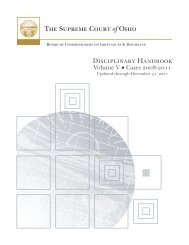State v. Winters - Supreme Court of Ohio - State of Ohio
State v. Winters - Supreme Court of Ohio - State of Ohio
State v. Winters - Supreme Court of Ohio - State of Ohio
Create successful ePaper yourself
Turn your PDF publications into a flip-book with our unique Google optimized e-Paper software.
14.<br />
{ 32} Furthermore, as to whether the prosecution proved that all <strong>of</strong> the<br />
merchandise retrieved from the car was stolen, we find that the jury could have reasonably<br />
inferred from the direct evidence (that phones and a GPS were stolen) that the Wal-Mart<br />
merchandise found in the car and in a garbage bag in the trunk was stolen that night as<br />
well. The jury could also reasonably infer from the direct evidence that appellant and<br />
Ostrander drove to a nearby gas station, had the opportunity to transfer stolen items from<br />
the car, and place them in the garbage bag in the trunk where they were later found by the<br />
police. Therefore, we find appellant's first assignment <strong>of</strong> error not well-taken.<br />
{ 33} In his second assignment <strong>of</strong> error, appellant argues that his conviction <strong>of</strong><br />
complicity to commit theft and possession <strong>of</strong> criminal tools is contrary to the manifest<br />
weight <strong>of</strong> the evidence.<br />
{ 34} Even when there is sufficient evidence to support the verdict, a court <strong>of</strong><br />
appeals may decide that the verdict is against the weight <strong>of</strong> the evidence. <strong>State</strong> v.<br />
Thompkins, supra, at paragraph two <strong>of</strong> the syllabus. When weighing the evidence, the<br />
court <strong>of</strong> appeals must consider whether the evidence in a case is conflicting or where<br />
reasonable minds might differ as to the inferences to be drawn from it, consider the weight<br />
<strong>of</strong> the evidence, and consider the credibility <strong>of</strong> the witnesses to determine if the jury<br />
clearly "lost its way, and created such a manifest miscarriage <strong>of</strong> justice that the conviction<br />
must be reversed and a new trial ordered." <strong>State</strong> v. Thompkins, supra, at 387. See, also,<br />
<strong>State</strong> v. Smith (1997), 80 <strong>Ohio</strong> St.3d 89, 114, certiorari denied (1998), 523 U.S. 1125.

















